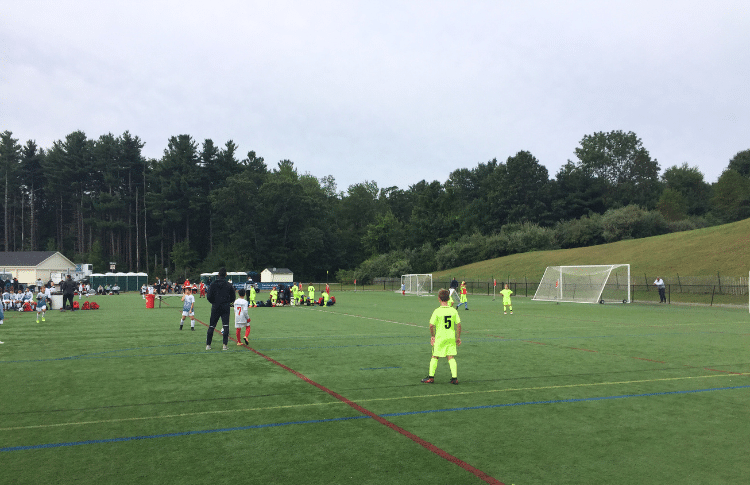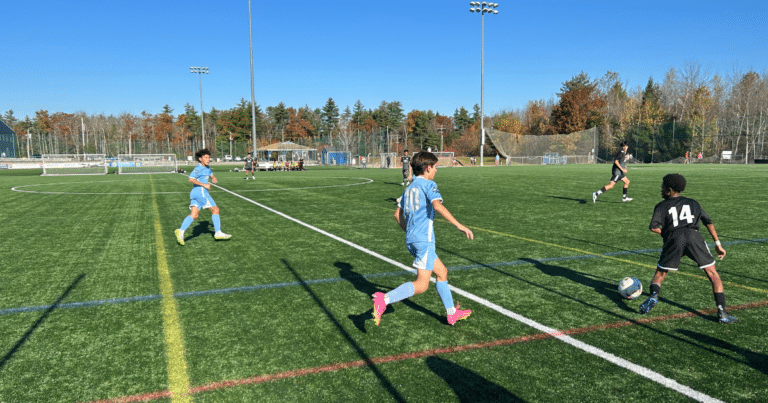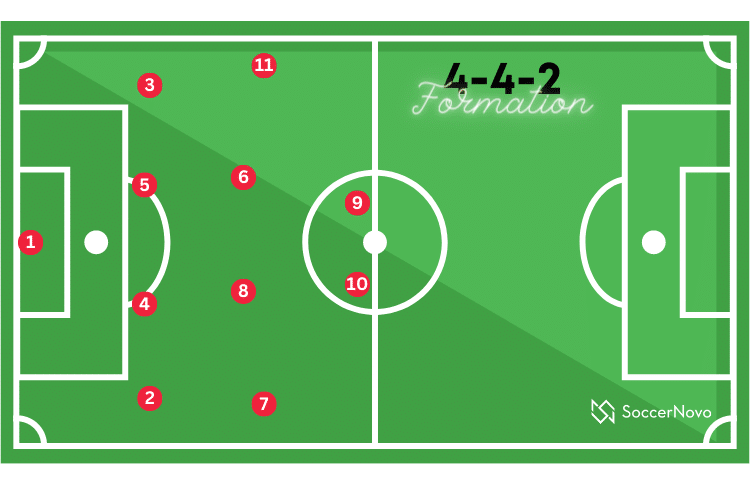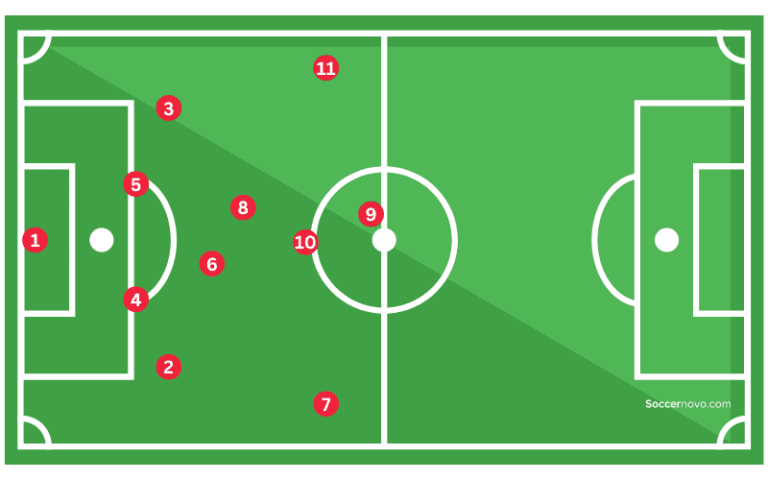How to Play Goalie in Soccer
Playing goalie in soccer is a challenging and important role. As the last man or woman of the defense, you are responsible for preventing the opposing team from scoring goals.
It requires a unique set of unique skills, including quick reflexes, good communication, and strategic decision-making.
To begin, you need to have a strong understanding of the game. You should know the rules and be able to read the flow of the game.
As a goalie, you need to be able to anticipate the movements of the opposing team and position yourself accordingly.
You should also be able to communicate effectively with your teammates, providing them with instructions and warnings when necessary.
Moreover, being able to stay calm under pressure is also important, as you will often face high-pressure situations where you need to make split-second decisions.
With practice and dedication, almost anyone can learn how to play goalie and become a valuable asset to their team.
As an aside, most parents steer their kids to play a field position and, because of this, there are ample opportunities for goalies to succeed on club teams. If you are looking to play as a goalkeeper, this article is right for you!
Basic Goalie Skills
As a soccer goalie, you play a critical role in your team’s defense. To become an effective goalie, you must master several basic skills. In this section, we will cover two of the most important skills: positioning and communication.
Positioning
You need to be in the right place at the right time to make a save. Here are some tips to help you position yourself effectively:
- Stand in the center of the goal line, with your feet shoulder-width apart.
- Keep your weight on the balls of your feet, so you can move quickly in any direction.
- Keep your hands up and ready to make a save.
- Stay alert and focused, so you can react quickly to any shots.
- Positioning starts early. As you see a play progress, angle your body to make the goal appear smaller.
By following these tips, you’ll be in a good position to make saves and defend your goal.
Communication
As a goalie, you need to be able to communicate clearly and often to coordinate your defense. Remember, you are the last line of defense so you may see more than the fullbacks.
- Use clear and concise language to communicate with your teammates.
- Call out the position of the opposing team’s players so your defenders know where they are.
- Use hand signals to communicate with your defenders.
- Encourage and support your teammates.
- Avoid “bossing” players around. Add complements to your instructions.
By communicating effectively, you can help your team work together to defend your goal and win the game.
Tips for Beginner Goalies
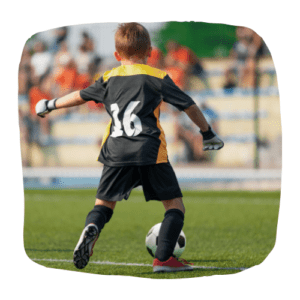 As a beginner goalie, it can be intimidating to step into the net and face the opposing team. However, with the right mindset and techniques, you can become a confident and successful goalie. Here are some tips to help you get started:
As a beginner goalie, it can be intimidating to step into the net and face the opposing team. However, with the right mindset and techniques, you can become a confident and successful goalie. Here are some tips to help you get started:
Focus on Footwork
Footwork is actually crucial for goalies. You need to be able to move quickly and efficiently to make saves and defend the net.
Practice shuffling side-to-side, backpedaling, and moving forward to challenge the opposing player. Make sure to stay on your toes and be ready to move in any direction at a moment’s notice.
Also, you’ll also need to play the ball with your feet quite a bit. Many youth coaches want their defenders to play it back to the keeper. The keeper needs to secure the ball and then pass to another teammate in almost one motion.
Master Your Positioning
You need to be in the right place at the right time to make saves and block shots.
Make sure to position yourself in the center of the net and stay on your toes. Or, slide into position on the nearest post if the ball is on one side of the field.
Keep your eye on the ball and be ready to move quickly to make a save or deflect a pass.
Communicate with Your Teammates
As a youth goalie, you have a unique perspective on the game and can help direct your teammates.
Make sure to communicate with your defenders and let them know when to mark opposing players or when to move up the field.
Use Your Hands Wisely
As a goalie, you are allowed to use your hands to make saves.
However, you need to be careful not to commit a handball. Make sure to keep your hands within the penalty area and only use them to make saves or clear the ball.
Also, don’t pick up the ball if it is passed back by a teammate. This will result in a penalty being called.
Remain Calm and Confident
Goalkeeping can be a stressful position especially if you are new to it. The key is to understand that goals will happen but it’s important to remain calm and confident.
Stay focused and keep your head in the game. Remember, you are a very important part of your team, and they are counting on you to make saves and defend the net.
Ball Handling
As a goalkeeper, ball handling is an essential skill that you need to master. It involves catching, punching, and controlling the ball with your feet. In this section, we’ll discuss the two primary techniques of ball handling: catching and punching.
Catching
Catching is the most common technique used by goalkeepers. To catch the ball, you need to position yourself correctly and keep your eyes on the ball at all times. Here are some tips to help you catch the ball effectively:
- Purchase a quality pair of goalie gloves that fit you just right.
- Keep your hands relaxed and open, with your fingers pointing upwards.
- Move towards the ball and position yourself directly under it.
- Keep your body behind the ball to ensure you have a solid base.
- Watch the soccer ball into your hands and absorb the impact.
Punching
Punching is a technique used when you can’t catch the ball. Sometimes you get more reach when you punch the ball out. It’s a more aggressive technique that involves punching the ball away from the goal. Here are some tips to help you punch the ball effectively:
- Position yourself correctly, with your body weight on your toes.
- Keep your hands in fists, with your thumbs on the outside.
- Punch the ball with a straight arm and a firm wrist.
- Aim to punch the ball away from the goal and towards the sidelines.
- If the ball is traveling towards the back of the net, punch the ball high and take advantage of the velocity to make it go out of bounds over the crossbar.
Defending the Goal
As a goalie, your primary responsibility is to defend the goal and prevent the opposing team from scoring. Here are some tips on how to effectively defend the goal:
Blocking Shots
This is an obvious one. Blocking shots is a crucial part of playing goalie. To block shots effectively, you need to be positioned correctly and be ready to move quickly. Here are some things to keep in mind:
- Position yourself in the center of the goal, with your feet shoulder-width apart and your knees slightly bent.
- Keep your hands up and ready to block the ball.
- Watch the ball closely and be prepared to move in any direction.
- If the ball is coming straight at you, use your hands to block it.
- If the ball is coming at an angle, use your feet to block it.
One-on-One Situations
In one-on-one situations, it’s just you versus the opposing player. These situations can be intimidating, but with the right approach, you can come out on top. Here’s what to do:
- Stay calm and focused. Don’t let the opposing player intimidate you.
- Position yourself between the ball and the goal.
- Be patient and wait for the opposing player to make a move.
- When the player makes a move, react quickly and decisively.
- If the player shoots the ball, use your hands or feet to block it.
- In most cases, the offensive player will want to go low and to one side. Anticipate which side and commit.
Physical and Mental Preparation
Fitness – Stay in Shape
There’s a perception that goalies don’t need to be in the same shape as field players but this is a lie. Your fitness level will determine your ability to move quickly and make saves. You should focus on building endurance, strength, and agility.
In terms of endurance, you should be able to run for at least 30 minutes without feeling exhausted. This will help you stay alert throughout the game and make quick decisions. Running, swimming, and cycling are all great ways to improve your endurance.
Strength training is also important. You need to have strong legs and core to jump high and make saves. Squats, lunges, and calf raises will help you build the necessary leg strength.
Additionally, you should work on your upper body strength to help you push off the ground and catch the ball. Push-ups, pull-ups, and bench presses are all great exercises for building upper body strength.
Agility is another key component of fitness. You need to be able to move quickly and change direction on a dime. Incorporate drills that focus on lateral movements, such as ladder drills and cone drills, into your training routine.
Mental Toughness
Let’s face it…you need to be mentally strong to play goalie. Not everyone can play it.
As a matter of fact, I look at my son’s U13 team and can think of only two other players who would be decent goalies. The rest of the players (my son included), wouldn’t have the mental grit it takes to be an effective keeper.
To develop mental toughness, you need to practice visualization. Imagine yourself making saves and keeping the ball out of the net. This will help you stay focused and confident during the game.
You should also practice mindfulness. This means being present in the moment and not getting distracted by outside factors. Take deep breaths and focus on your breathing to help you stay calm and centered.
Finally, you need to be able to handle pressure. Practice scenarios where the game is on the line and you need to make a save to win. This will help you develop the mental toughness needed to handle high-pressure situations.
Final Thoughts on Playing Goalie
Playing goalie is tough. It takes a special type of player to step up and be the deciding factor for a team.
You must be headstrong, be willing to take risks, have a short memory and acquire soccer skills to become a good goalkeeper.
With hard work and dedication, players can make a soccer career out of being a goalie. Even though there’s only one goalie playing at a time, the opportunities to play are abundant!
I hope this helps you understand the goalie position and its importance!

Written By: SoccerNovo
SoccerNovo is an independent youth soccer media brand built to help parents, players, and coaches better understand the game and the pathways available in U.S. soccer. Our mission is to make youth soccer simpler, clearer, and more accessible for everyone involved in it.
Let’s connect


